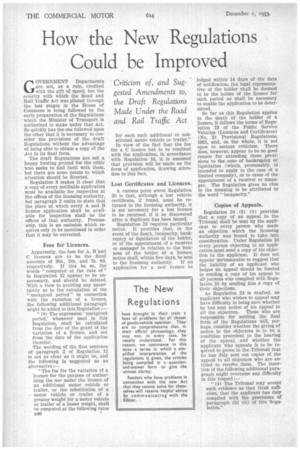How the New Regulations Could be Improved
Page 58

If you've noticed an error in this article please click here to report it so we can fix it.
GOVERNMENT Departments are not, as a rule, credited with the gift of speed, but the celerity with which the Road and Rail Traffic Act was piloted through the last stages in the House of Commons is being followed by the early preparation of the Regulations which the Minister of Transport is authorized to make under that Act. So quickly has the one followed upon the other that it is necessary to consider the provisions of the draft Regulations without the advantage of being able to obtain a copy of the Act in its final form.
The draft Regulations are not a happy hunting ground for the critic who seeks to find fault with them, but there are some points to which attention should be directed.
Regulation 8 makes it clear that a copy of every notifiable application must be available for inspection at the offices of the licensing authority, but paragraph 2 omits to state that the place at which every A and B licence application shall be available for inspection shall be the offices of that authority. Presumably, this is an omission which requires only to be mentioned in order that it may be corrected.
Fees for 'Licences.
Apparently, the fees for A, Band C licences are to be the fixed amounts of 30s., 20s. and 7s. 6d. respectively. If this be so, the words "computed at the rate of" In Regulation 12 appear to be unnecessary, and should be deleted. With a view to avoiding any uncertainty as to the calculation of the "unexpired period" in connection with the variation of a licence, the following additional paragraph might be added to this Regulation :— " (8) The expression unexpired period,' whenever used in this Regulation, shall be calculated from the date of the grant of the variation of a licence, and not from the date of the application therefor.
The wording of the first sentence of paragraph 2 of Regulation 12 Is not as clear as it might be, and the following is suggested as an alternative:— " The fee for the variation of a licence for the purpose of authorizing the use under the licence of an additional motor vehicle or trailer, or the substitution of a • motor vehicle or trailer of a greater weight for a motor vehicle or trailer of a lesser weight, shall he computed at the following rates B40 for each such additional or sub stituted motor vehicle or trailer."
In view of the fact that the fee for a C licence has to be remitted with the application, in accordance with Regulation 16, it is assumed that provision will be made on the form of application, drawing attention to this fact.
Lost Certificates and Licences.
A curious point about Regulation 20 is that, although a lost vehicle certificate, if found, must be returned to the licensing authority, it Is not necessary for a lost licence to be returned if it be discovered after a duplicate has been issued.
Regulation 23 requires particular notice. It provides that, in the event of the death, incapacity, bankruptcy or liquidation of the holder, or of the appointment of a receiver or manager in relation to the business of the holder of a licence, notice shall, within five days, be sent to the licensing authority. If an application for a new licence be
lodged within 14 days of the date of notification, the legal representative of the holder shall be deemed to be the holder of the licence for such period as shall be necessary to enable the application to be determined.
So far as this Regulation applies to the death of the holder of a licence, it follows the terms of Regulation 13 of the Public Service Vehicles (Licences and Certificates) (No. 2) Provisional Regulations, 1931, and, on the whole, it is not open to serious criticism. There does, however, appear to be no good reason for extending those provisions to the case of bankruptcy or liquidation (which, presumably, is intended to apply to the case of a limited company), or to cases of the appointment of a receiver or manager. The Regulation gives no clue to the meaning to be attributed to the word "incapacity."
Copies of Appeals.
Regulation 24 (3) (ii) provides that a copy of an appeal to the Tribunal shall be sent by the applicant to every person who made an objection which the licensing authority was bound to take into consideration. Under Regulation 10 every person objecting to an application must send a copy of his objection to the applicant. It does not appear unreasonable to suggest that the liability of an applicant who lodges an appeal should be limited to sending a copy of his appeal to all persons who complied with Regulation 10 by sending him a copy of their objections.
As Regulation 24 is drafted, an applicant who wishes to appeal may have difficulty in being sure whether he has sent notice of his appeal to all the objectors. Those who are responsible for settling the final form of the Regulations will, perhaps, consider whether the giving of notice to the objectors is to be a condition precedent to the hearing of the appeal, and whether the applicant who appeals cs to be required to prove to the Tribunal that he has duly sent out copies of the appeal to all objectors who are entitled to receive them. The insertion of the following additional paragraph might overcome any difficulty in this respect :—
" (4) The Tribunal may accept such evidence as they think sufficient, that the applicant has duly complied with the provisions of paragraph (3) (ii) of this Regulation."




































































































